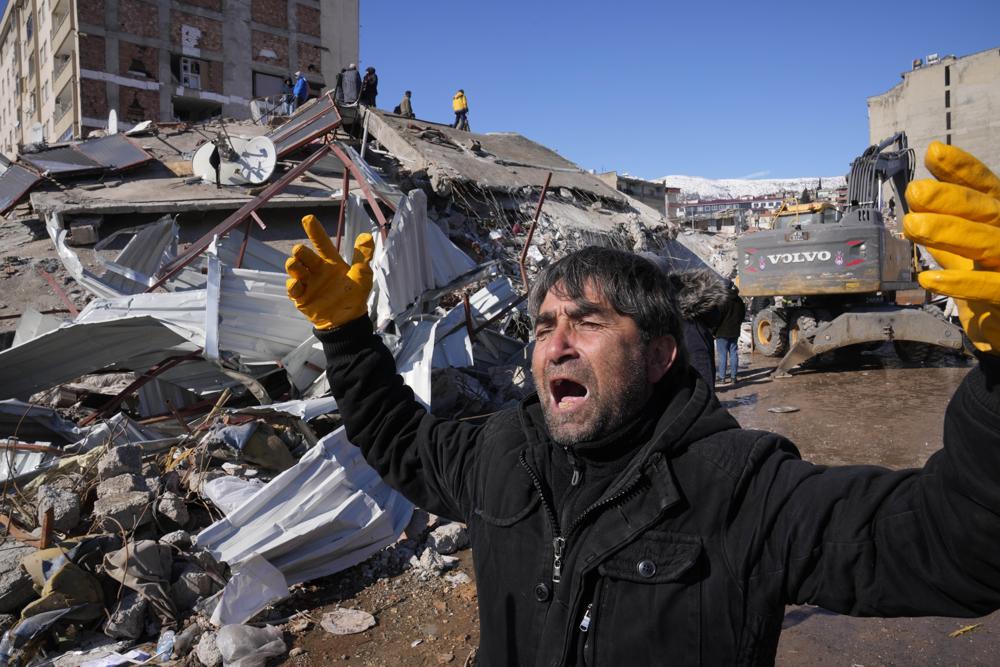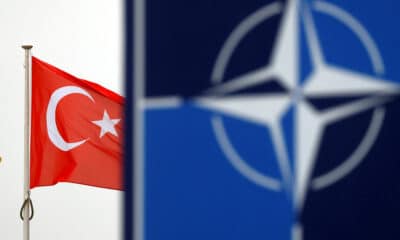U.K News
Hope Fading As Deaths In Turkey, Syria Quake Pass 11,000

GAZIANTEP, Turkey — Rescue teams in Turkey and Syria looked for signs of life in the rubble of thousands of buildings destroyed by the world’s deadliest earthquake in more than a decade on Wednesday, when the chances of finding survivors were getting slimmer. The confirmed death toll has surpassed 11,000 people.
Turkish President Recep Tayyip Erdogan paid a visit to the particularly hard-hit Hatay province, where over 3,300 people were killed, and entire neighborhoods were destroyed. Residents have criticized the government’s response, claiming that rescuers arrived too slowly.
Erdogan, who faces a tough reelection battle in May, acknowledged “shortcomings” in responding to Monday’s 7.8 magnitude earthquake but blamed it on winter weather. The earthquake damaged the runway at Hatay Airport, further complicating the response.
“Preparing for such a disaster is impossible,” Erdogan said. “We will not abandon any of our citizens.” He also slammed critics, calling them “dishonorable people” who spread “lies and slander” about the government’s response.
Turkish authorities claim to be combating disinformation, and an internet monitoring group reported that access to Twitter was restricted, despite survivors using it to alert rescuers.
In Syria and Turkey, search teams from more than a dozen countries have joined thousands of local first responders. However, the scale of destruction caused by the earthquake and its powerful aftershocks was so massive and spread over such a large area — including a region isolated by Syria’s ongoing civil war — that many people were still waiting for help.
People Rush To Save The Turkey People
Experts said that people who were stuck under the rubble or couldn’t get what they needed were running out of time to stay alive. At the same time, they stated that it was too soon to give up hope.
“The first 72 hours are critical,” according to Steven Godby, a natural hazards expert at Nottingham Trent University in England. “The average survival ratio within 24 hours is 74%, 22% after 72 hours, and 6% by the fifth day.”
Rescuers occasionally used excavators or picked carefully through debris. With thousands of buildings destroyed, it was unclear how many people were still trapped beneath the rubble.
According to Ozel Pikal, who saw eight bodies pulled from the ruins of a building in the Turkish city of Malatya, bodies were placed side by side on the ground and covered in blankets while rescuers waited for vehicles to pick them up.
Pikal, who assisted in the rescue efforts, believes at least some of the victims died as temperatures dropped to minus 6 degrees Celsius (21 Fahrenheit).
“There is no hope left in Malatya as of today,” Pikal said over the phone. “No one is emerging from the rubble alive.”
A Horrible Hit For The ALready Impacted Syrian People
Road closures and damage in the area made it difficult to reach all areas needing assistance, he said, and there needed to be more rescuers where he was. Meanwhile, the cold weather hampered those who were present, including volunteers.
“Because of the cold, our hands can’t pick up anything,” Pikal explained. “Working machines are required.”
Syria’s civil war had already lasted more than a decade in the region. Millions of Syrians have been displaced, and millions have sought refuge in Turkey.
Turkey’s president announced that the country’s death toll had surpassed 9,000. According to the Syrian Health Ministry, the death toll in government-held areas has surpassed 1,200. According to the volunteer first responders known as the White Helmets, at least 1,400 people have died in the rebel-held northwest.
This brought the total to 11,600. Thousands more have been injured.
Rescue stories continued to give hope that some of those still trapped might be found alive. A crying newborn still connected to her deceased mother by the umbilical cord was rescued in Syria on Monday. Rescuers pulled a 3-year-old boy from the rubble in Turkey’s Kahramanmaras.
The Actual Death Toll In Turkey Could Take Weeks
However, David Alexander, a professor of emergency planning and management at University College London, said that data from previous earthquakes indicated that the chances of survival were now slim, particularly for those who suffered serious injuries.
“Statistically, today is when we’ll stop finding people,” he predicted. “That doesn’t mean we should give up looking.”
Because of the sheer volume of rubble, Alexander warned that the final death toll could take weeks to determine.
The last earthquake that killed so many people was in 2015 when a magnitude 7.8 quake struck Nepal. A tsunami was triggered by an earthquake in Japan in 2011, killing nearly 20,000 people.
Many who survived the earthquake lost their homes and were forced to sleep in cars, in government shelters, or outside in some areas due to rain and snowfall.
“We don’t have a tent, a heating stove, or anything else. “Our children are in bad shape,” said Aysan Kurt, 27. “We did not die of hunger or the earthquake, but we will die of cold.”
People Arrested For Looting
The disaster comes at a critical juncture for Erdogan, who is dealing with an economic downturn and high inflation. Perceptions that his administration mishandled the crisis could harm his standing. He stated that the government would give affected families 10,000 Turkish lire ($532) each.
The leader of Turkey’s main opposition party, Kemal Kilicdaroglu, blamed the devastation on Erdogan’s two-decade rule, saying he had not prepared the country for a disaster and accusing him of misusing funds.
Police said they had detained 18 people and identified more than 200 social media accounts suspected of “spreading fear and panic” in their efforts to combat disinformation related to the earthquake response.
According to NetBlocks, access to Twitter is restricted to multiple internet providers in Turkey. Trapped survivors used Twitter to alert rescuers and loved ones, while others used it to criticize the government’s response.
There has been no official response to the restrictions. The government has periodically restricted access to social media during national emergencies and terror attacks, citing national security.
UN Has Sent Help To Turkey
Aid efforts in Syria have been hampered by the ongoing conflict and the isolation of the rebel-held border region, surrounded by Russia-backed government forces. Syria is an international pariah due to Western sanctions related to the war.
The European Union announced on Wednesday that Syria had requested humanitarian assistance to assist earthquake victims. An E.U. representative insisted that the bloc’s sanctions against the Syrian government had no bearing on its ability to assist.
Muhannad Hadi, the United Nations humanitarian coordinator for Syria, said Wednesday that due to damaged roads, there still needs to be access to the Bab al-Hawa border crossing into rebel-held Syria, the only terminal where U.N. aid can be delivered.
Using other crossings or sending aid across conflict lines from Damascus necessitates “multiple levels of coordination between different parties, security, humanitarian, and non-governmental organizations,” he said. “This is not a simple operation.”
Critics have accused the Syrian government of deliberately slowing the process to cut off support to rebel-held areas.
Turkey is situated on major fault lines and is frequently jolted by earthquakes. In 1999, similar powerful earthquakes struck northwest Turkey, killing 18,000 people.
SOURCE – (AP)
U.K News
June UK Inflation Remains at the 2% Target, with a Potential rate cut on the “Knife Edge.”

(VOR News) – Inflation in the United Kingdom stayed constant at the target rate of 2% that was established by the Bank of England in the year leading up to June, as indicated by official figures that were issued on Wednesday.
It is possible that this result will be sufficient for policymakers to accomplish their goal of lowering the cost of borrowing money the following month.
The Office of National Statistics reports that the hospitality business, which includes establishments such as hotels and restaurants, was responsible for the most substantial upward contribution to the annualized inflation rate.
A number of analysts are of the opinion that the increased pricing can be attributable to the fact that Taylor Swift is now on tour in the United Kingdom.
The clothing and footwear business, which had extensive sales throughout the month, was the sector that made the most substantial contribution to the fall in sales.
When the flat number was compared to June of the previous year, it was slightly higher than what was projected to be the case. In the majority of instances, analysts had anticipated a modest fall to 1.9% of the total economy.
July 2021 was the last time inflation reached 2%.
Before the price increase began. As a result of the Coronavirus pandemic, supply chain concerns initially occurred. The increase in energy costs was attributed to Russia’s invasion of Ukraine. The situation was exacerbated by both of these factors.
The financial markets are anticipating that the decision about whether or not the Bank of England will decrease its main interest rate from 5.25% on August 1 will be something of a close call. Both of these decisions are expected to be made on August 1.
There are a number of policymakers who continue to voice concern regarding the extent of price rises in the vital services sector as well as the rate of wage increases. Both of these factors significantly increase the likelihood of a return in inflation in the event that interest rates are decreased too recently.
The deputy chief economist of abrdn, which was formerly known as Aberdeen Asset Management, stated that “Today’s inflation report will keep the Bank of England’s August rate decision on a knife edge because of the uncertainty surrounding it.”
Abrdn employee Luke Bartholomew made this inflation statement.
“More fundamentally, the persistent stickiness of service inflation will leave the Bank wondering how long inflation will remain at the 2% target,” according to the official statement.
In order to battle the quick development in inflation, which reached a peak of more than 11% in late 2022, the Bank of England, along with the Federal Reserve of the United States and other central banks, swiftly increased interest rates in late 2021 from near zero. This was done in order to counteract the rapid growth in inflation.
The British economy, on the other hand, has been slowed down by increased interest rates, which have contributed to the reduction of inflation by making it more expensive to borrow money.
There has been very little improvement in the economy of the United Kingdom since the recovery from the epidemic.
The Prime Minister of the United Kingdom, Keir Starmer, has underlined that the key purpose of his Labour government would be to increase the pace of economic growth in the United Kingdom.
This is the primary objective that he desires to achieve. An statement addressing the goals that his government has for the coming year is going to be made later on Wednesday and will be made public.
According to Starmer, the measures that were disclosed in the King’s Speech to Parliament will “create wealth for people up and down the country” and “take the brakes off Britain” by stimulating economic growth. This is what Starmer believes will happen.
SOURCE: USN
SEE ALSO:
Bangladesh closes Universities and Colleges indefinitely Following Deadly Protests.
Will The Seine Be Clean Enough By The Olympics? Not Even The Experts Know Yet
Biden Set to Announce Support for Major Supreme Court changes
U.K News
Exit Polls in UK Show Labour Party Headed for Landslide Victory

An exit poll indicated that, following 14 years of political and economic turmoil, voters would punish the governing Conservatives by handily electing the UK’s Labour Party to a landslide victory in Friday’s parliamentary election.
Moments after the polls closed, the results of the survey showed that Keir Starmer, the head of the center-left Labour party, will become the next prime minister of the nation. He will confront a jaded public that is eager for change in the face of a depressing economy, growing institutional mistrust, and a deteriorating social cohesion.
The Conservatives were in shock by their historic setback, which would leave the party in disarray and probably lead to a leadership contest against Prime Minister Rishi Sunak. Thousands of election workers were tallying millions of ballot papers at counting stations across the nation.
In the last hours before voting closed, London voter James Erskine expressed optimism for change, saying, “Nothing has gone well in the last 14 years.” “I just think there could be a huge change here, and that’s what I’m hoping for.”
Reform UK leader Nigel Farage stokes controversy
Though many of the same populist undercurrents flow in Britain, the proposed result seems to defy recent rightward electoral changes in Europe, especially in France and Italy.
With his party’s anti-immigrant “take our country back” stance, Reform UK leader Nigel Farage has stoked controversy and undermined support for the Conservatives, who already faced bleak chances.
The exit poll indicates that Labour will take around 410 seats in the 650-seat House of Commons, while the Conservatives will hold 131 seats. The Tories would have the fewest seats in their almost 200-year history, which would leave the party in chaos.
Some smaller parties, such as the moderate Liberal Democrats and Reform UK, seemed to have done well, which may be an indication of the unstable public mood and dissatisfaction with the system. One significant unanswered question was whether Farage’s hard-right party would be able to leverage its popularity to win more than a few seats in Parliament.
Labour Party politicians wary
The survey revealed “a catastrophic result in historic terms for the Conservative Party,” according to former Conservative leader William Hague. Nevertheless, Labour Party politicians were wary due to years of disillusionment.
Deputy leader Angela Rayner told AP News, “The exit poll is encouraging, but obviously we don’t have any of the results yet.”
Ipsos, a pollster, asks participants at a number of polling places to complete a duplicate ballot that represents their voting behavior. Typically, it offers a trustworthy but imprecise forecast of the result.
British voters cast paper votes, writing their selections in pencil, which are subsequently tallied by hand. We anticipate having final results by Friday morning.
A series of stormy years in Britain, some of which the Conservatives created and some of which they did not, have left many voters with doubts about the future of their nation.
The COVID-19 epidemic, Russia’s invasion of Ukraine, and the United Kingdom’s withdrawal from the European Union all hurt the economy, yet lockdown parties hosted by then-prime minister Boris Johnson and his staff infuriated the public.
Source: AP
U.K News
Former Top Northern Irish Politician Jeffrey Donaldson To Stand Trial Over Alleged Sex Offenses

Jeffrey Donaldson, the former head of Northern Ireland’s most famous pro-union party, will face trial on charges of previous sex offenses, including one of rape.
Donaldson went before a preliminary inquiry on Wednesday, which agreed to proceed with a trial set for September 10, according to a statement issued to CNN by the Northern Ireland Courts and Tribunals Service (NICTS).

Donaldson | CNN image
Former Top Northern Irish Politician Jeffrey Donaldson To Stand Trial Over Alleged Sex Offenses
The lawmaker has since been charged with an additional seven counts. The 18 alleged acts include one allegation of rape, 13 charges of indecent assault on a female youngster, and four counts of gross indecency toward a kid.
Donaldson was asked in court whether he wanted to speak about the charges, according to PA Media. “Not at this stage,” he said, according to the news agency.
Eleanor Donaldson, his wife, is also scheduled to stand trial in September. She has been charged with one count of helping and abetting rape, three counts of aiding and abetting assault on a female child, and one count of cruelty to a person under 16.
Donaldson led the DUP from 2019 through much of the contentious Brexit process, frequently expressing his opposition to the Northern Ireland Protocol, a vital component of the Brexit withdrawal agreement that ensured there would be no hard border between Northern Ireland and the Republic of Ireland.
Donaldson and his wife have already denied all claims, according to Irish national network RTÉ on Wednesday.

Jeffery Donaldson | CNN Image
Former Top Northern Irish Politician Jeffrey Donaldson To Stand Trial Over Alleged Sex Offenses
Donaldson’s trial was announced as Northern Ireland residents prepared to vote in the UK general election. Northern Ireland, one of the UK’s four devolved nations, has 18 members in the Westminster parliament. Northern Irish politicians can run for a seat in Westminster or the devolved legislature, the Northern Ireland Assembly. Sinn Féin, the leading nationalist party, does not take up their seats in Westminster if elected.
Donaldson was set to run again in the Lagan Valley constituency, but former DUP party colleague Jonathan Buckley has replaced him.
SOURCE – (CNN)
-
World2 weeks ago
Former President Trump Survives Being Shot at Pennsylvania Rally
-
Tech4 weeks ago
Huawei Launches 5G-A Pioneers Program at MWC Shanghai 2024: Paving the Way for a Connected Future
-
Sports4 weeks ago
NBA Draft: Kyle Filipowski Withdraws Unexpectedly From The First Round
-
Tech4 weeks ago
ChatGPT Answers Undiscovered Questions and Outperforms Students.
-
News4 weeks ago
US Supreme Court Rejects Drug Deal that Protects the Sackler Family
-
Health4 weeks ago
US Health Agency Issues Dengue Virus Infection Warning



























